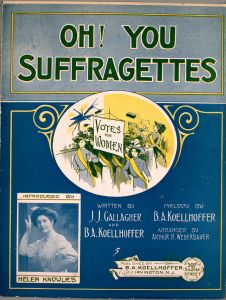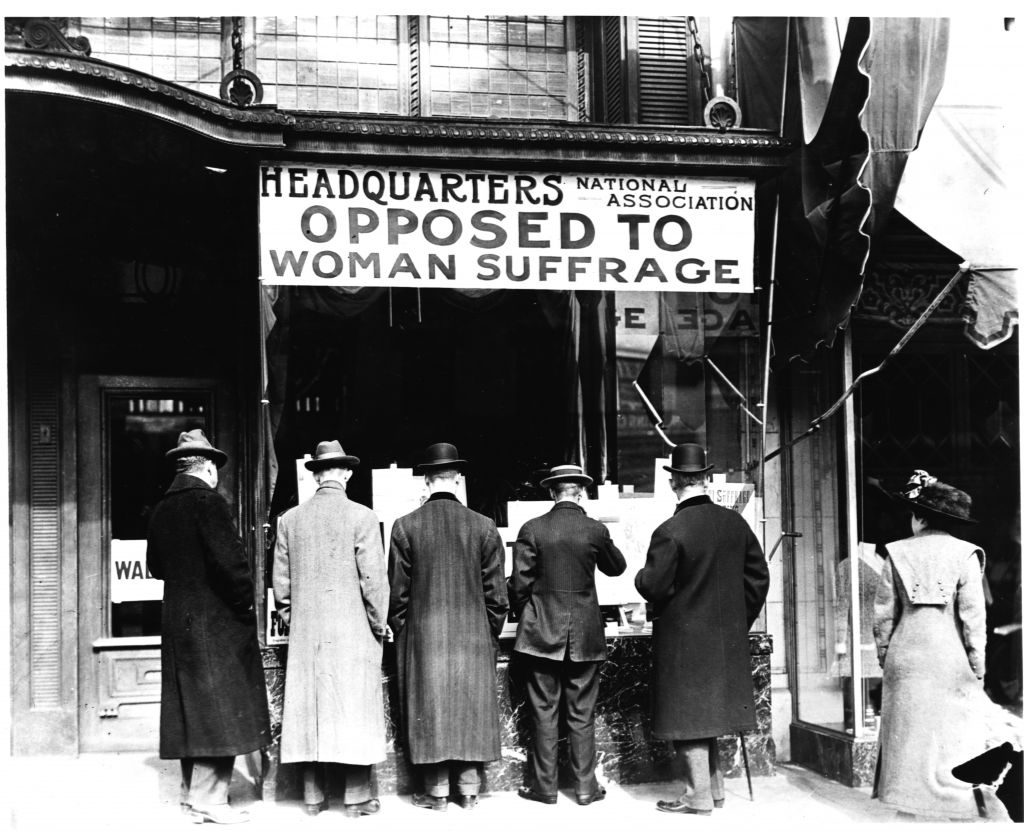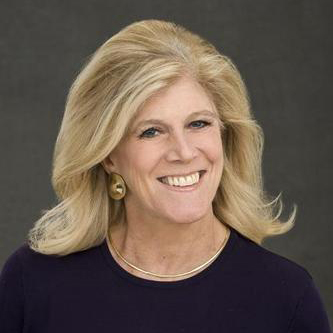
A line of suffragists march with banners that read "Come to the White House Sunday at 3," in Washington DC in 1915. (Photo by Harris & Ewing/Buyenlarge/Getty Images)
My mother was born in the United States of America without the right to vote. I just stopped to re-read that sentence because it seems so, you know, quaint. Okay, preposterous.
By the time she neared voting age in 1920, the 19th Amendment to the Constitution was ratified, prohibiting federal and state governments from denying citizens the right to vote “on account of sex.” For the next seven decades, Mother didn’t miss an election. As a child, I remember watching her dress for the occasion: girdle and stockings, dress and heels, hat and gloves, because like many first-generation Americans who’d endured two World Wars, she considered voting a formal affair, a sacred privilege — and duty — defined by her citizenship.

Sheet music cover image of Oh! You Suffragettes by J. J. Gallagher, B. A. Koellhoffer and Arthur H. Weberbauer, with lithographic or engraving notes reading “unattrib photo of Knowles,” Irvington, NJ, 1912. (Photo by Sheridan Libraries/Levy/Gado/Getty Images)
That’s my ritual, too (without the body armor), which is why this Friday, Aug. 26 — the 96th anniversary of the day American women got the vote — I’ll offer my annual thanks to the women and men who made it happen. Their exhausting slog over more than half a century was, as noted by the leader of the final surge, Carrie Chapman Catt, agonizing: “480 campaigns to urge legislatures to submit suffrage amendments to voters; 47 campaigns to induce state constitutional conventions to write woman suffrage into state constitutions; 277 campaigns to persuade state party conventions to include woman suffrage planks; 30 campaigns to urge presidential party conventions to adopt woman suffrage planks in party platforms, and 19 campaigns with 19 successive Congresses.”
Not to mention countless insults, inanities and hurled rotten eggs.
But the result changed the dynamic, opening the electoral process to more individuals than ever before in American history. And with Hillary Clinton now tying her historic candidacy to the legacy of our foremothers, it’s useful to recall its unique place in our often grudgingly shared democracy.
Early suffrage leaders understood their goal as a natural right of citizenship, right up there with life, liberty and the pursuit of happiness. Elizabeth Cady Stanton, who rewrote the Declaration of Independence along feminist lines for the 1848 Seneca Falls women’s rights convention, bemoaned the “degradation of disfranchisement.” But when men didn’t share on the simple grounds of equality, some women resorted to a higher calling — moral superiority — slyly predicting that female reformers would elevate and cleanse the corrupt political world; that everything from the drunken rowdiness on election day to the character of candidates would be purified. According to Susan B. Anthony, woman suffrage would “compel both political parties to nominate candidates of the highest character. A woman would no more vote for a low-down man than a good man for a degraded woman.”
Yeah, well.
In fact, most women feared the vote in the early days, and worked against suffrage. They called it “the burden of the ballot,” and dreaded stepping down from their pedestals because they’d no longer enjoy “respect, tenderness, chivalry” from men. One California society lady said without irony, “Women are emotional creatures. If their vote is not merely a duplicate of their husband’s or father’s or brother’s, there will be terrible dissension in the family.”
Men who opposed suffrage (again, the majority) also foresaw the cascade of dominos. Letting women vote meant they’d also run for office, fretted one New Jersey congressman in 1895, and that would cause “the deterioration of Congress.” A South Dakota senator simply foresaw “chaos!”

A group of men stand in front of the Headquarters National Association opposed to Woman Suffrage. (Photo by Harris & Ewing, Inc./Library of Congress/Corbis/VCG via Getty Images)
Anthony, as ever, had a far sunnier view, good-humoredly advising women to civilize polling places by adding flowers and ferns, then envisioning their descent on the Capitol to end all spitting, smoking and loutish behavior: “The huge cuspidors at every seat will be banished, the heating registers will no longer emit the fumes of burned tobacco juice; the two houses and the corridors will cease to be filled with tobacco smoke thick enough to cut with a knife. The desks will not be used as foot benches; decency and good order will be observed in the discussions, and the proprieties of civilized society will obtain. … May the good time come speedily!”
Give her half credit.
With the passage of the 19th Amendment, polling places moved from smoke-filled saloons and barbershops to more female-friendly schools and firehouses where alcohol and cigars were banned, a change in circumstances that did not strike everyone as an upgrade. “It ain’t like it used to be,” complained one New York City policeman at a voters’ registration booth on New York’s then very seedy Lower East Side in October 1920. With “No smoking” signs and crowds of chatty moms in line with the men-folks, the once gang-ridden slum looked more like a church social. “Since the women’s been mixing in,” he grumbled to a reporter, “politics ain’t the same.”
New York was one of two dozen states (preceded by territories) that granted at least some form of suffrage to millions of women before 1920. But with all those other states now included, the more serious question became, how would the nearly 27 million eligible new voters handle the privilege?
That is, how would they line up politically?
Back in the post-Civil War days when woman suffrage first emerged, the support came from Republicans — still the party of Lincoln — because of their common concerns, rooted partly in the abolition movement. Republicans were still in control during ratification, but there was no immediate payback.
No “women’s bloc” emerged. No party profited. And only some 9 million women (about 35 percent) voted in 1920, compared to nearly twice as many men, a situation that didn’t improve much over the few decades. Women, it seemed, were voting pretty much like the men. The headline of one of many similar articles echoed public sentiment: “Is suffrage a failure?”
It certainly did little for African-American women in the South, who (along with black men) struggled another 45 years to abolish poll taxes, literacy tests and other insidious means of voter suppression. By then the fight for civil rights was led by Democrats.
But in time, the tide turned, and women have been the majority at every recent election. They also tend to identify and vote Democratic. The gender gap that helped put Bill Clinton into office in 1996 (he won the votes of 11 percent more women than men) edged up to 13 percent for President Obama in 2008.
Suddenly, finally, women were players, their influence felt on both sides. Getting a vote of their own was the kind of life-changing equivalent — in the public sphere — of the path women took privately to get a room of their own — to work, to write, to think.
“The myth that feminism failed after 1920 because feminists did not organize women into a major political force obscured what was really going on,” writes historian Jo Freeman in A Room at a Time: How Women Entered Party Politics. She highlights the emergence of the Party women — Democrat and Republican activists who stayed behind the scenes and “prepared women for political work and enlarged their sphere of activity. They did this through education, legitimation and infiltration…. And by doing what was possible, women went into politics the same way they got suffrage: slowly and persistently, with great effort, against much resistance, a room at a time.”
It was evolution, not revolution, and it laid the groundwork for every advance and every candidate of both parties from 1920 onward, including Hillary Clinton. She won’t — and can’t — banish sexism just by being there. Neither could the presidency of Barack Obama end racism. But just as the 19th Amendment gave women like my mother some small piece of the civic discourse for the first time, having Clinton at the top of the ticket has already helped transform how society views women. And how women view themselves.
Carrie Chapman Catt eloquently described the long march to enfranchisement as “a continuous, seemingly endless chain of activity. Young suffragists who helped forge the last links of that chain were not born when it began. Old suffragists who forged the first links were dead when it ended.”
By celebrating their success every Aug. 26, we perpetuate their vision and their determination, adding new connections of our own, with gratitude. Politics ain’t the same? Nothing is. That’s called progress. So Happy Anniversary, Number 19. And thank you.




